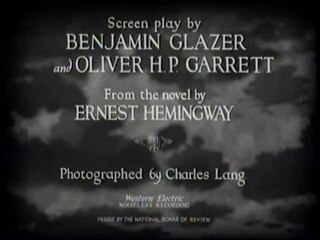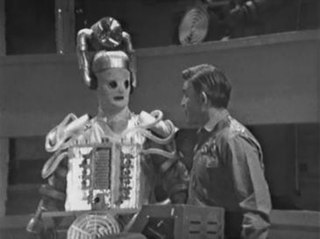This is a list of characters in the American television series Early Edition which ran from September 28, 1996 to May 27, 2000. The characters are listed alphabetically by their last name or by the name which appears in the episode credits.
This is a list of characters in the American television series Early Edition which ran from September 28, 1996 to May 27, 2000. The characters are listed alphabetically by their last name or by the name which appears in the episode credits.
The characters listed in this section are those whose portrayer has appeared in the opening credits. They are listed according to the order in the opening credits. [1]
| Name | Description | Portrayer | Seasons |
|---|---|---|---|
| Gary Hobson | Hobson, who grew up in the state of Indiana, lived and worked in Chicago as a stockbroker until his wife Marsha left him. After this dramatic event, Gary began receiving The Paper, and subsequently left his job. As he kept encountering more and more opportunities to help people and prevent tragedies using The Paper, he proved himself to be a person of high integrity and upstanding morals. Gary had difficulty finding another love interest, and at the conclusion of the series still remained single. | Kyle Chandler | 1–4 [2] |
| Marissa Clark | Blind since the age of 16 months after contracting meningitis, she was formerly a receptionist at the stock brokerage firm Hobson formerly worked at. [3] She too left the brokerage firm, ultimately helping Gary Hobson manage McGinty's Bar later in the series. During the first season, Gary uses horse-track winnings to help her purchase a guide dog named Spike, who remained with her until the show's end. Similar to Gary, Marissa was never married during the series. | Shanésia Davis-Williams | 1–4 |
| Chuck Fishman | Fishman, a friend of Gary's, is a former fellow stockbroker. He would like to make profit out of The Paper, besides helping people. | Fisher Stevens | 1–2 (Starring), 3–4 (Guest Starring) |
| Erica Paget | Paget works at McGinty's. She is the mother of Henry Paget and is divorced from her husband, Michael. She briefly dated Gary. | Kristy Swanson | 3 |
| Henry Paget | Son of Erica Paget, who loves to hang around Gary | Myles Jeffrey | 3 |
| Patrick Quinn | Bartender at McGinty's | Billie Worley | 3–4 |
Recurring characters that appeared on Early Edition. [1]
| Name | Description | Portrayer | Seasons |
|---|---|---|---|
| Paul Armstrong | Police detective that has a few run-ins with Gary and is constantly trying to figure out what he is hiding | Michael Whaley | 3–4 |
| Toni Brigatti | Police detective that has a few run-ins with Gary; a confirmed love interest in season four | Constance Marie | 3–4 |
| Marion Zeke Crumb | Police detective that believes Gary is strange, but a good guy | Ron Dean | 1–4 |
| Miguel Diaz | Photographer who wants to find out the truth about how Gary knows things | Luis Antonio Ramos | 4 |
| Bernie Hobson | Gary's father | William Devane | 1–4 |
| Lois Hobson | Gary's mother | Tess Harper | 2–4 |

Cluedo, known as Clue in North America, is a murder mystery game for three to six players that was devised in 1943 by British board game designer Anthony E. Pratt. The game was first manufactured by Waddingtons in the United Kingdom in 1949. Since then, it has been relaunched and updated several times, and it is currently owned and published by the American game and toy company Hasbro.

Magic Knight Rayearth is a Japanese manga series created by Clamp. Appearing as a serial in the manga magazine Nakayoshi from the November 1993 issue to the February 1995 issue, the chapters of Magic Knight Rayearth were collected into three bound volumes by Kodansha, and were published from July 1994 to March 1995. A sequel was serialized in the same manga magazine from the March 1995 issue to the April 1996 issue, and was published by Kodansha in three bound volumes from July 1995 to April 1996. The series follows three eighth-grade girls who find themselves transported from modern-day Japan into a magical world, where they are tasked with rescuing a princess.

The Snowman is a 1982 British animated television film based on Raymond Briggs's 1978 picture book The Snowman. It was directed by Dianne Jackson for Channel 4. It was first shown on 26 December 1982, and was an immediate success. It was nominated for Best Animated Short Film at the 55th Academy Awards and won a BAFTA TV Award.

Blue Peter is a British children's television entertainment programme created by John Hunter Blair. It is the longest-running children's TV show in the world, having been broadcast since October 1958. It was broadcast primarily from BBC Television Centre in London until September 2011, when the programme moved to dock10 studios at MediaCityUK in Salford, Greater Manchester. It is currently shown live on the CBBC television channel on Fridays at 5pm. The show is also repeated on Saturdays at 11:30am, Sundays at 9:00am and a BSL version is shown on Tuesdays at 2:00pm.

Early Edition is an American fantasy comedy-drama television series that aired on CBS from September 28, 1996, to May 27, 2000. Set in Chicago, Illinois, it follows the adventures of a man who mysteriously receives each Chicago Sun-Times newspaper the day before it is actually published, and who uses this knowledge to prevent terrible events every day. Created by Ian Abrams, Patrick Q. Page, and Vik Rubenfeld, the series starred actor Kyle Chandler as Gary Hobson, and featured many real Chicago locations over the course of the series' run.
A cold open is a narrative technique used in television and films. It is the practice of jumping directly into a story at the beginning of the show before the title sequence or opening credits are shown. In American television, this is often done on the theory that involving the audience in the plot as soon as possible will reduce the likelihood of their switching from a show during the opening commercial. A cold open may also be used to recap events in previous episodes or storylines that will be revisited during the current episode.

Closing credits or end credits are a list of the cast and crew of a particular motion picture, television program, or video game. Where opening credits appear at the beginning of a work, closing credits appear close to, or at the very end of a work. A full set of credits can include the cast and crew, but also production sponsors, distribution companies, works of music licensed or written for the work, various legal disclaimers, such as copyright and more.

In a motion picture, television program or video game, the opening credits or opening titles are shown at the very beginning and list the most important members of the production. They are now usually shown as text superimposed on a blank screen or static pictures, or sometimes on top of action in the show. There may or may not be accompanying music. When opening credits are built into a separate sequence of their own, the correct term is a title sequence.

Allen Francis Doyle is a fictional character created by Joss Whedon for the television series Angel. The character was portrayed by Glenn Quinn. Doyle is a seer who receives prophetic visions from The Powers That Be, usually of people in peril. Half-human, half-demon, his demon heritage allows him to manage them without suffering any permanent damage. His half-Brachen demon physiology grants him the ability to shift from normal human to demonic appearance, in which he has heightened sense of smell and superior strength, speed, stamina, and dexterity, the last of which allows him to twist his head around in such a manner as to fake a broken neck. However, Doyle rarely used his Brachen powers, preferring to remain human, thus limiting his usefulness in a fight.

The Tenth Planet is the partly missing second serial of the fourth season in the British science fiction television series Doctor Who, which was first broadcast in four weekly parts from 8 to 29 October 1966. It was William Hartnell's last regular appearance as the First Doctor, and the first story to feature the process later termed regeneration, whereby the lead character, The Doctor, undergoes a transformation into a new physical form. Patrick Troughton makes his first, uncredited appearance as the Second Doctor.

Billing is a performing arts term used in referring to the order and other aspects of how credits are presented for plays, films, television, or other creative works. Information given in billing usually consists of the companies, actors, directors, producers, and other crew members.
"Imakuni?" (イマクニ?), is a name of a costumed character played by Tomoaki Imakuni and created for the promotion of Pokémon series related products and services. Imakuni? appeared in many promotional live events conducted in Japan between 1997 and 2002, although his appearance in front of public has declined since. His name is also credited in many of the Pokémon series songs, which can be found in the more than ten releases of CDs. In one of the releases in 1998, Imakuni? participated as one of the trio members of a one-time session group dubbed "Suzukisan", in which he sang together with popular enka singer Sachiko Kobayashi and German-born American expatriate performer Raymond Johnson. Imakuni? also appears sometimes as an enemy with his own personal trading card devoted to him in the Pokémon Trading Card Game series.

The Name of the Game is an American television series starring Tony Franciosa, Gene Barry, and Robert Stack, which aired from 1968 to 1971 on NBC, totaling 76 episodes of 90 minutes each. The show was a wheel series, setting the stage for The Bold Ones and the NBC Mystery Movie in the 1970s. The program had the largest budget of any television series at that time.

Treehouse of Horror is an annual series of special Halloween-themed episodes of the animated sitcom The Simpsons, with 33 anthology episodes between 1990 and 2022. Also known as The Simpsons Halloween Specials, each episode typically consists of three separate, self-contained segments. Each segment involves the Simpson family in some comical horror, science fiction, or supernatural setting; plot elements operate beyond the show's normal continuity, with segments exaggeratedly more morbid and violent than a typical Simpsons episode.
Two types of credits are traditionally used in films, television programs, and video games, all of which provide attribution to the staff involved in their productions. While opening credits will usually display only the major positions in a production's cast and crew, closing credits will typically acknowledge all staff members that were involved in the production.

The Bill is a British police procedural television series, first broadcast on ITV from 16 August 1983 until 31 August 2010. The programme originated from a one-off drama, Woodentop, broadcast in August 1983.
"Can You Tell Me How to Get to Sesame Street?" is the theme song of the children's television series Sesame Street. It is the oldest song in Sesame Street's history, dating back to the show's beginning on November 10, 1969, and has been used as the title song in every episode of the show.

Dad's Army is a British television sitcom about the United Kingdom's Home Guard during the Second World War. It was written by Jimmy Perry and David Croft, and originally broadcast on BBC1 from 31 July 1968 to 13 November 1977. It ran for nine series and 80 episodes in total; a feature film released in 1971, a stage show and a radio version based on the television scripts were also produced. The series regularly gained audiences of 18 million viewers and is still shown internationally.

Jonny Quest is an American animated science fiction adventure television series about a boy who accompanies his scientist father on extraordinary adventures. It was produced by Hanna-Barbera Productions for Screen Gems, and was created and designed by comic book artist Doug Wildey.